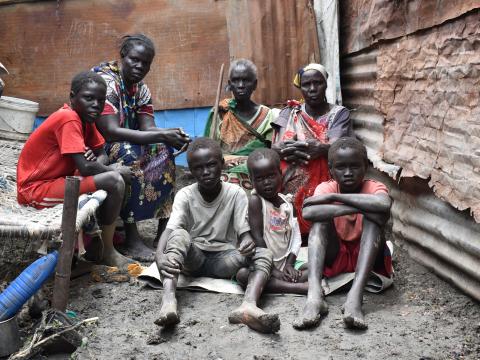Women turn to scavenging in the forest as hunger crisis worsens in South Sudan’s most vulnerable places

Have you ever imagined what life is like for Elizabeth, a blind 65-year old widow without any income but has to feed her two children and eight grandchildren?
Elizabeth lives in the Protection of Civilians Camp in Malakal County, a part of South Sudan’s Upper Nile State since 2013 when the conflict in the country affected her village.
“This is my 9th year in the camp and we depended on food assistance to survive”, she says. She had worked as a prison warden but lost her job during the crisis.
Until that fateful day in December 2013 when the crisis started, she lived contentedly in her own home. This is now a thing of the past after they fled.

To earn income for the family’s sustenance, Elizabeth also tried supplying water to local restaurants and was paid less than USD1 per jerrican.
“But when I started losing my vision, I was forced to stop”, she says. She once went to fetch water for sale at the tap but could not find her way home.
When her daughter Nyanakim got married, Elizabeth was the happiest mother and encouraged her to be the best wife and mother to her children. But she now suffers from mental illness.

“The crisis devastated her and affected her mentally. I take care of her and the children. Her husband left and we have no idea where he is”, she adds.
Elizabeth now sells firewood from the forest to supplement the food that she receives from World Vision. The 10 members of her family all depend on the meagre food ration.
I am happy that God has kept my family alive this far, but I am worried any of us can die due to hunger. We are in a dire situation and we need food.
“The food usually lasts for two days, then I start going to the forests looking for firewood and wild vegetables to feed the family”, Elizabeth shares with us a sad smile.
World Vision’s Information Reporting Officer Angelina Beuo for the Food Assistance Program said the food given to the women in the camp is not enough to sustain them for a month.

This reality pushed women and girls to look for other means of survival that is putting their lives at risk of death – like scavenging at the forest.
Together with neighbours and the other women in the community in a group of 20 or more, Elizabeth scour for firewood and wild vegetables. Everyone supports her knowing her frail condition.
There was a time when she did not go for three days after the news spread in the camp that a woman was raped in the forest. But she eventually got over her fear seeing the children pale with hunger.

She adds, “I am happy that God has kept my family alive this far, but I am worried any of us can die due to hunger. We are in a dire situation and we need food.”
World Vision, with support from the World Food Programme (WFP) assists 31,483 people with food ration composed of cereals, pulses, vegetable oil and salt.
It has additional corn, soy-blend (CSB++) for children aged 6–23 months and pregnant and lactating women under blanket supplementary feeding program.

The reduction of food assistance due to funding constraints felt globally impacted at least 35,000 school children served by World Vision’s school feeding programs in five counties including Malakal.
Commodity Officer Miyen Joseph says, “The funding gap forced us to reduce the food ration making women and children more vulnerable. We appeal for more assistance so the people can survive from their dire situation.”
Watch World Vision's work in South Sudan in the WVSS YouTube Channel.
Story and photos by Jemima Tumalu, Communications Officer